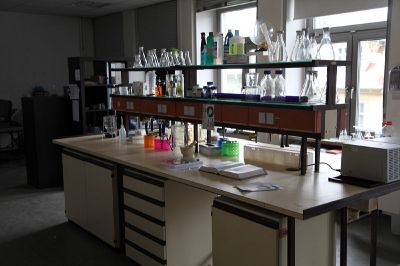(Created page with "One hundred years ago, Lazlo Moholy-Nagy described the so-called primitive human as a hunter, a craftsman, a builder and a physician all in one person. According to Moholy-Nag...") |
No edit summary |
||
| (27 intermediate revisions by 5 users not shown) | |||
| Line 1: | Line 1: | ||
[[File:m-IMG_4573.JPG|400px|thumb|left|DIY Biolab]] | |||
''Lecturer:'' [[:Category:Mindaugas Gapševičius|Mindaugas Gapševičius]]<br> | |||
''Credits:'' 6 [[ECTS]], 4 [[SWS]]<br> | |||
''Date:'' Tuesdays 17:00-20:30<br> | |||
''Venue:'' [[Marienstraße 7b]], [[GMU:Bio-lab|Biolab]] (Room 202)<br> | |||
''First meeting:'' Tuesday, 16 October 2018; 17:00-20:30<br> | |||
<br style="clear: both"> | |||
One hundred years ago, Lazlo Moholy-Nagy described the so-called primitive human as a hunter, a craftsman, a builder and a physician all in one person. According to Moholy-Nagy, the skills of the primitive human were lost in the modern age, contemporaneously to the industrial revolution, when humans became specialized in one or the other craft. Today, having knowledge of a different kind could, for example, help in understanding how technologies or matter interact; and spontaneous ideas could, perhaps, suggest unexpected models for interaction between different technologies or different kinds of matter. | One hundred years ago, Lazlo Moholy-Nagy described the so-called primitive human as a hunter, a craftsman, a builder and a physician all in one person. According to Moholy-Nagy, the skills of the primitive human were lost in the modern age, contemporaneously to the industrial revolution, when humans became specialized in one or the other craft. Today, having knowledge of a different kind could, for example, help in understanding how technologies or matter interact; and spontaneous ideas could, perhaps, suggest unexpected models for interaction between different technologies or different kinds of matter. | ||
| Line 4: | Line 13: | ||
Along with very practical things, we will talk about maker culture, its ways of work and focusses. While discussing artworks related to biology, we will develop individual ideas, which will finally become our projects. Final projects will be presented in Berlin. | Along with very practical things, we will talk about maker culture, its ways of work and focusses. While discussing artworks related to biology, we will develop individual ideas, which will finally become our projects. Final projects will be presented in Berlin. | ||
===syllabus=== | |||
*16.10.2018 [[/Introduction to conceptual framework and tools]] + Safety | |||
*23.10.2018 [[/Ethics]] + Microscopy | |||
*30.10.2018 [[/Isolating bacteria]] | |||
*06.11.2018 [[/Growing mycelium]] + capturing electric potentials in organic matter | |||
*13.11.2018 [[/First ideas]] | |||
*04.12.2018 [[/Notes on recorded electric potentials]] | |||
*18.12.2018 [[/Cyanobacteria]] | |||
===students=== | |||
*[[/Antje Danz]] | |||
*[[/Sirin Unmanee]] | |||
*[[/Niloofar Ghanavati]] | |||
*[[/Nyiko Johannes Mucavele]] | |||
*[[/Paola Stephania Calderón]] | |||
*[[/Frederic Blais-Belanger]] | |||
*[[/Nezar Abualhalaweh]] | |||
[[Category:WS18]] | |||
[[Category:Werkmodul]] | |||
[[Category:Fachmodul]] | |||
[[Category:Mindaugas Gapševičius]] | |||
Latest revision as of 20:55, 19 February 2021
Lecturer: Mindaugas Gapševičius
Credits: 6 ECTS, 4 SWS
Date: Tuesdays 17:00-20:30
Venue: Marienstraße 7b, Biolab (Room 202)
First meeting: Tuesday, 16 October 2018; 17:00-20:30
One hundred years ago, Lazlo Moholy-Nagy described the so-called primitive human as a hunter, a craftsman, a builder and a physician all in one person. According to Moholy-Nagy, the skills of the primitive human were lost in the modern age, contemporaneously to the industrial revolution, when humans became specialized in one or the other craft. Today, having knowledge of a different kind could, for example, help in understanding how technologies or matter interact; and spontaneous ideas could, perhaps, suggest unexpected models for interaction between different technologies or different kinds of matter.
This course is an introduction to the DIY biology, and alongside it, its relation to artistic practices. We will learn how to take care of different organisms, including bacteria, fungi, and protists like Euglena and slime molds. The DIY Bio course also includes practical use of equipment around the biolab, such as the autoclave, microliter pipet, clean bench, centrifuge, PCR machine and electrophoresis chamber.
Along with very practical things, we will talk about maker culture, its ways of work and focusses. While discussing artworks related to biology, we will develop individual ideas, which will finally become our projects. Final projects will be presented in Berlin.
syllabus
- 16.10.2018 /Introduction to conceptual framework and tools + Safety
- 23.10.2018 /Ethics + Microscopy
- 30.10.2018 /Isolating bacteria
- 06.11.2018 /Growing mycelium + capturing electric potentials in organic matter
- 13.11.2018 /First ideas
- 04.12.2018 /Notes on recorded electric potentials
- 18.12.2018 /Cyanobacteria
